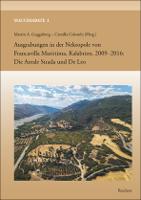Macchiabate I. Ausgrabungen in der Nekropole von Francavilla Marittima, Kalabrien, 2009-2016
Die Areale Strada und De Leo
Contributor(s)
Guggisberg, Martin A. (editor)
Colombi, Camilla (editor)
Collection
Swiss National Science Foundation (SNF)Language
GermanAbstract
The Iron Age site of Francavilla Marittima in northern Calabria is one of the most important points of contact between the local population and the Greeks and Levantines who expanded to Italy in the early 1st millennium BC. Since the discovery and initial research of the settlement and its necropolis on the Macchiabate plateau by the Italian archaeologist Paola Zancani Montuoro, the site has played a key role in the discussion about the early processes of cultural exchange and appropriation in the western Mediterranean. The decisive factor here is the fact that around 720/10 BC, in about 10 km distance from Francavilla Marittima and thus within sight, the Greek colony Sybaris was founded. How this permanent Greek presence has affected the role and self-image of the indigenous population in the hinterland of the colony is the subject of ongoing controversy. The model of a rapid and radical change of the native cultural area into a Greek chora is contrasted with the thesis of a gradual merging of the native with the Greek world. The graves in particular played an important role as closed contexts. The Basel excavations in the necropolis aim to provide a new basis for assessing the cultural transformation process on the threshold from the Iron Age to the colonial era. In this volume, the excavation results from 2009–2016 in the burial areas Strada and De Leo are published. They testify to the variety of reactions to the foreign in the indigenous burial ritual and suggest that the permanent settlement of Greeks on the coast has profoundly changed the indigenous cultural fabric in the hinterland. Although there were some spots in the necropolis with new graves dating to the 7th century BC, the Strada area proves the discontinuation of burial activities around 700 BC. Conversely, the local settlement community was in a state of upheaval at this time. The present publication thus makes a contribution to researching early migration and mobility processes in the Mediterranean region and the related question of cultural identity.
Keywords
Calabria; Cemetery; Cultural contacts; Grave-finds; Greek Colonies; Iron Age; Macchiabate; Magna Graecia; necropolis; Oenotrian Culture; Southern ItalyDOI
10.29091/9783752000283ISBN
9783752000283, 9783752000184, 9783752000283Publisher
Reichert VerlagPublication date and place
2021Imprint
Reichert VerlagSeries
Macchiabate, 1Classification
Archaeology
Italy


 Download
Download Web Shop
Web Shop